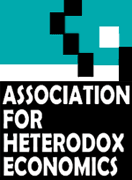Contents
- Corporate Power in a Global Economy
- Economics and Sustainability
- Economics as a Social Science
- Economics in Context: Goals, Issues, and Behavior
- The Economics of Global Climate Change
- European Business Environment
- From Political Economy to Economics
- Indian political economy
- Macreconomic Activity in Context
- Macreconomic Measurement: Environmental and Social Dimensions
- Psychology for Economists
- State and Economy
Corporate Power in a Global Economy
Brian Roach (Tufts University)
Standard economic theory fails to address the economic and political significance of modern multinational corporations. In this module explanations of firm growth based on economies of scale and scope are supplemented with a discussion of the transnational mobility and influence of large corporations. The social and environmental responsibilities of multinationals are considered, with an emphasis on externalities and the need for a “triple bottom line.” The module concludes with a discussion of ways to encourage large firms to adopt goals that are aligned with the broader goals of society.
Economics and Sustainability
Anthony Plumridge (University of the West of England, Bristol)
A five-side primer introducing key concepts from the mainstream and from ecological economics, extracted from a forthcoming book. .doc format. Copyright Anthony Plumridge, all rights reserved.
Economics as a Social Science
Piet Keizer (Utrecht University)
113-page booklet including assessment questions, written July 2008. Chapters include The Character of Modern Science; Genesis and Development of Economics as a Social Science; Multidisciplinary Economics, an Introduction; Some Basic Sociology for Economists. Contains test questions with answers.
Economics in Context: Goals, Issues, and Behavior
Neva Goodwin, Julie A. Nelson, Frank Ackerman, and Thomas Weisskop (Tufts University)
This module draws on the first two chapters of Microeconomics in Context to present the study of economics in a broad social and environmental context. The traditional economic goal of efficiency is presented as an intermediate goal in the pursuit of a final goal of well-being. The module introduces the issues of externalities and transactions costs, and, crucially, adds the activity of “resource maintenance” to the usual discussion of the activities of production, distribution, and consumption. Finally, the module updates the standard treatment of economic agents by drawing on recent research on motivations and behavior.
The Economics of Global Climate Change
Jonathan Harris and Brian Roach (Tufts University)
This module discusses the scientific evidence on climate change, including recent projections on temperature and sea-level rise. It then evaluates the strengths and weaknesses of economic analysis of the issue, including discussion of valuation of environmental damages, carbon taxes, tradable permits, and current policy issues.
European Business Environment
Nick Potts (Southampton Solent University)
This is the student handout for a Level 2 Business Studies module in the economics of the European Business Environment. Lecture notes for this module may be seen in the 'lecture notes' folder.
From Political Economy to Economics
William Dixon (London Metropolitan University)
Module handbook for level 3 module in history of economic thought at LondonMet.
Indian political economy
Barbara Harriss-White (University of Oxford)
This is the student handout for a module in Indian political economy forming part of the MSc in Contemporary India at Oxford. Students are not presumed to have previous knowledge of economics.
Macreconomic Activity in Context
Neva Goodwin, Julie A. Nelson, and Jonathan Harris (Tufts University)
This module, which draws on the second chapter of Macroeconomics in Context, introduces standard concepts of economic modeling, efficiency, scarcity, opportunity cost, the production possibilities frontier, and the advantages of market systems. It also includes a review of graphing techniques. However, the module sets these into a broader context of concern for well-being by discussing the institutional requirements of markets and the limitations of markets.
Macreconomic Measurement: Environmental and Social Dimensions
Neva Goodwin, Julie A. Nelson, and Jonathan Harris (Tufts University)
This module, drawn from the sixth chapter of Macroeconomics in Context, presents an overview of innovations in national accounting related to measuring well-being. The module describes satellite accounts for the environment, methods of counting household production, and the construction of well-being indicators such as the Genuine Progress Indicator and the Human Development Index.
Psychology for Economists
Piet Keizer (Utrecht University)
42-page text which discusses six approaches in psychology – cognitive, behaviourist, biological, psychodynamic, humanistic and social psychology - to find out what orthodox economics needs in order to extend its analysis with the more realistic idea of imperfect rationality. Dated September 2010.
State and Economy
William Dixon (London Metropolitan University)
Student handout for a Level 3 module in State and Economy at LondonMet.
↑ Top



